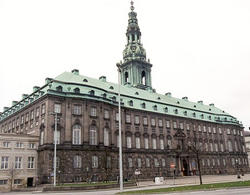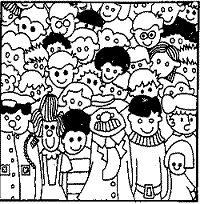| Friday, April 4, 2003 |  |
|
|
|
 One thing I appreciate about how Denmark is run, which I didn't see the same way when I lived there, is that people who are in the position to decide big things will talk it over, seemingly endlessly. Well, that's what it used to look like to me. The news is filled with politicians talking and talking; people speaking for many different sides; nobody apparently committed to much of anything. That is drastically different from the U.S. where the news is filled first of all with disasters, and secondly with politicians who seem very sure about everything, but who only seem to have the opinions they're being paid for having by their corporate handlers. And nobody actually *talks* things over. It is more about getting your side to win, through force, persuasion, lies, money, diversion, or whatever it takes. One thing I appreciate about how Denmark is run, which I didn't see the same way when I lived there, is that people who are in the position to decide big things will talk it over, seemingly endlessly. Well, that's what it used to look like to me. The news is filled with politicians talking and talking; people speaking for many different sides; nobody apparently committed to much of anything. That is drastically different from the U.S. where the news is filled first of all with disasters, and secondly with politicians who seem very sure about everything, but who only seem to have the opinions they're being paid for having by their corporate handlers. And nobody actually *talks* things over. It is more about getting your side to win, through force, persuasion, lies, money, diversion, or whatever it takes.
In Denmark, the politicians actually seem to be there to talk things through, so that the right decisions can be made. And even though everybody still hates most of them, and even though it takes a while to get anywhere, it is quite real. Working things through with everybody who has a stake is a shared value. Most politicians will be very non-committal, and will refer to that things have to be talked through before they can state anything with certainty. And what I realize now is that this is a good thing. A commitment to dialogue and consensus and openness. Most Danes will probably not agree or recognize this, and will probably tell me that the politicians really are a bunch of crooks, and that nothing gets done, and everything is really bad. But, seeing it from the outside, and only visiting once in a while, things are not too bad in Denmark. It is a wealthy country that takes good care of its people. People are friendly, and everything works. It all looks better than it did when I moved from there 18 years ago. Something is working.
Thomas Madsen Mygdal predicts that the next Danish prime minister will have a weblog. He might very well be right. Whereas it wouldn't work for the current style of politicians in the U.S., it would work well for most Danish politicians.
As a matter of fact, the prior Danish prime minister, Poul Nyrup Rasmussen, now has a weblog. It is in Danish, so chances are you can't read it. But it is real. He talks about what he does every day and what he feels about it. That is a real big thing, for a politician to be open like that. And I hope the world sees more of that.
[ Politics | 2003-04-04 12:16 | 0 comments | PermaLink ]
|
|
|
|
 Jim Moore has an excellent article: The Second Superpower Rears its Beautiful Head and a new weblog. Jim Moore has an excellent article: The Second Superpower Rears its Beautiful Head and a new weblog."As the United States government becomes more belligerent in using its power in the world, many people are longing for a "second superpower" that can keep the US in check. Indeed, many people desire a superpower that speaks for the interests of planetary society, for long-term well-being, and that encourages broad participation in the democratic process. Where can the world find such a second superpower? No nation or group of nations seems able to play this role, although the European Union sometimes seeks to, working in concert with a variety of institutions in the field of international law, including the United Nations. But even the common might of the European nations is barely a match for the current power of the United States.
There is an emerging second superpower, but it is not a nation. Instead, it is a new form of international player, constituted by the "will of the people" in a global social movement. The beautiful but deeply agitated face of this second superpower is the worldwide peace campaign, but the body of the movement is made up of millions of people concerned with a broad agenda that includes social development, environmentalism, health, and human rights. This movement has a surprisingly agile and muscular body of citizen activists who identify their interests with world society as a whole—and who recognize that at a fundamental level we are all one. These are people who are attempting to take into account the needs and dreams of all 6.3 billion people in the world—and not just the members of one or another nation. Consider the members of Amnesty International who write letters on behalf of prisoners of conscience, and the millions of Americans who are participating in email actions against the war in Iraq. Or the physicians who contribute their time to Doctors Without Borders/ Medecins Sans Frontieres.
While some of the leaders have become highly visible, what is perhaps most interesting about this global movement is that it is not really directed by visible leaders, but, as we will see, by the collective, emergent action of its millions of participants." Great stuff. This article has gotten quite some attentionon the net in the past few days, and the meme seems to be taking hold. Moore somewhat equates the power he's talking about with the peace movement, which probably isn't necessary, although it is a good example. The key point is that there's a new mechanism at play here."Thus the new superpower demonstrates a new form of "emergent democracy" that differs from the participative democracy of the US government. Where political participation in the United States is exercised mainly through rare exercises of voting, participation in the second superpower movement occurs continuously through participation in a variety of web-enabled initiatives. And where deliberation in the first superpower is done primarily by a few elected or appointed officials, deliberation in the second superpower is done by each individual—making sense of events, communicating with others, and deciding whether and how to join in community actions. Finally, where participation in democracy in the first superpower feels remote to most citizens, the emergent democracy of the second superpower is alive with touching and being touched by each other, as the community works to create wisdom and to take action." Count me in. Moore's article naturally also attracted some flak on the net. I'm not going to link to the few people who didn't like it. But it is always interesting to see who feels very threatened by subjects such as freedom, openness, self-organization, collective consciousness, leaderless organization, and that kind of thing."Which brings us to the most important point: the vital role of the individual. The shared, collective mind of the second superpower is made up of many individual human minds—your mind and my mind—together we create the movement. In traditional democracy our minds don’t matter much—what matters are the minds of those with power of position, and the minds of those that staff and lobby them. In the emergent democracy of the second superpower, each of our minds matters a lot. For example, any one of us can launch an idea. Any one of us can write a blog, send out an email, create a list. Not every idea will take hold in the big mind of the second superpower—but the one that eventually catches fire is started by an individual. And in the peer-oriented world of the second superpower, many more of us have the opportunity to craft submissions, and take a shot." Finally Moore proposes a bit of the HOW in how we get there:"First, we need to become conscious of the "mental processes" in which we are involved as members of the second superpower, and explore how to make our individual sense-making and collective action more and more effective. This of course means challenging and improving the mass media, and supporting more interactive and less biased alternatives. But more ambitiously, we will need to develop a kind of meta-discipline, an organizational psychology of our community, to explore the nature of our web-enabled, person-centered, global governance and communication processes, and continue to improve them." It is all quote obvious, of course. Of course WE, the people of this planet, are the real power here. It is only because we're badly organized, badly informed, and communicating badly, that a very, very small percentage of us, who are better organized, can drag the rest of us around by the nose. What is going to change all of it is a form of organization that will ONLY work for all of us, and that will be of no use for the old power elite. You can call it self-organization, emergent democracy, the transparent society, the global brain, or whatever, but it is sure to make the old structures become gradually irrelevant once we get a better sense of it. It is a huge threat to the power elite, and to the traditional superpower(s), but the kicker is that it really makes no sense to them, so they will probably not succeed in suppressing it. They will try, but those attempts will look increasingly obvious and strange.
[ Organization | 2003-04-04 13:38 | | PermaLink ] More >
|
|
|
|
 Jewel posts some great quotes from comedians, that succeed in presenting the paradoxical truth in one-liners, like nothing else could. Some examples: Jewel posts some great quotes from comedians, that succeed in presenting the paradoxical truth in one-liners, like nothing else could. Some examples:"War continues in Iraq. They're calling it Operation Iraqi Freedom. They were going to call it Operation Iraqi Liberation until they realized that spells 'OIL.'" -- Jay Leno
"President Bush has said that he does not need approval from the UN to wage war, and I'm thinking, well, hell, he didn't need the approval of the American voters to become president, either." -- David Letterman
"In a speech earlier today President Bush said if Iraq gets rid of Saddam Hussein, he will help the Iraqi people with food, medicine, supplies, housing, education ? anything that's needed. Isn't that amazing? He finally comes up with a domestic agenda ? and it's for Iraq. Maybe we could bring that here if it works out." -- Jay Leno
[ Opinions | 2003-04-04 15:00 | | PermaLink ] More >
|
|
|
|
 Britt has an excellent post, Sitting in the Counting House, referencing a post by Ross Mayfield that notes how the presence of counting tools change the game. When coins were introduced in market places, new things became possible. Now, with the prospect of introducing reliable ratings into economic transactions, it might change things significantly. Now Britt says some good things like: Britt has an excellent post, Sitting in the Counting House, referencing a post by Ross Mayfield that notes how the presence of counting tools change the game. When coins were introduced in market places, new things became possible. Now, with the prospect of introducing reliable ratings into economic transactions, it might change things significantly. Now Britt says some good things like:"We need to get our hands around the choke point that's preventing the right things from being counted. I suggest that the check point is who controls the data and thus the character of the data kept. We assume that data is always kept by the seller, but is that so?
Consider this:- Whenever a seller and a buyer intersect, the data is maintained by the seller, as we expect.
- Whenever an employer and an employee intersect, the data is maintained by the employer. (Who is the buyer of the services.)
In the first case, the data keeper is the seller, not the customer. In the second, though, the keeper of the data is the customer, purchasing the employee's work. So it's not about the roles of the players, It's about size and who is the designer of the transaction. Data is the asset of the designer of the business agreement, and a liability to the other party to the agreement, who's subservient to the keeper's records.
I emphasize designer of the transaction because transactions are designed ad hoc, one-at-a-time, like component parts in machines before Eli Whitney invented standardized parts. Perhaps our economy has become too complicated to let transactions be designed for the sole benefit of whoever thinks it up first and has superior data resources." Excellent observations, and then this core point:Proprietary Data is the Basis of Tyranny Yep. So the advantage is usually with the people who decide what data is captured and how, and who control access to that data. That explains a helluva lot of things about our society. Even the money system is based on that, by making sure that the information called dollars and cents can only be created according to certain rules, designed by those who have the most to gain from them. And media companies with eternal copyrights - same thing. And governments who allow themselves to gather information that the rest of us aren't allowed to look at.
The action item for us is to figure out how to count things that aren't counted, in regards to the quality and history of many things, and the activities of people and companies, and to make that data easily available and impossible to hide. If good, reliable data is widely and freely available, that allows us to make informed decisions on who and what to deal with, and who and what to avoid - it is going to be very hard to try to force us to do anything less.
[ Organization | 2003-04-04 19:01 | 0 comments | PermaLink ]
|
|
 One thing I appreciate about how Denmark is run, which I didn't see the same way when I lived there, is that people who are in the position to decide big things will talk it over, seemingly endlessly. Well, that's what it used to look like to me. The news is filled with politicians talking and talking; people speaking for many different sides; nobody apparently committed to much of anything. That is drastically different from the U.S. where the news is filled first of all with disasters, and secondly with politicians who seem very sure about everything, but who only seem to have the opinions they're being paid for having by their corporate handlers. And nobody actually *talks* things over. It is more about getting your side to win, through force, persuasion, lies, money, diversion, or whatever it takes.
One thing I appreciate about how Denmark is run, which I didn't see the same way when I lived there, is that people who are in the position to decide big things will talk it over, seemingly endlessly. Well, that's what it used to look like to me. The news is filled with politicians talking and talking; people speaking for many different sides; nobody apparently committed to much of anything. That is drastically different from the U.S. where the news is filled first of all with disasters, and secondly with politicians who seem very sure about everything, but who only seem to have the opinions they're being paid for having by their corporate handlers. And nobody actually *talks* things over. It is more about getting your side to win, through force, persuasion, lies, money, diversion, or whatever it takes.
 Jim Moore has an excellent article: The Second Superpower Rears its Beautiful Head and a new weblog.
Jim Moore has an excellent article: The Second Superpower Rears its Beautiful Head and a new weblog. Jewel posts some great quotes from comedians, that succeed in presenting the paradoxical truth in one-liners, like nothing else could. Some examples:
Jewel posts some great quotes from comedians, that succeed in presenting the paradoxical truth in one-liners, like nothing else could. Some examples: Britt has an excellent post, Sitting in the Counting House, referencing a post by Ross Mayfield that notes how the presence of counting tools change the game. When coins were introduced in market places, new things became possible. Now, with the prospect of introducing reliable ratings into economic transactions, it might change things significantly. Now Britt says some good things like:
Britt has an excellent post, Sitting in the Counting House, referencing a post by Ross Mayfield that notes how the presence of counting tools change the game. When coins were introduced in market places, new things became possible. Now, with the prospect of introducing reliable ratings into economic transactions, it might change things significantly. Now Britt says some good things like: